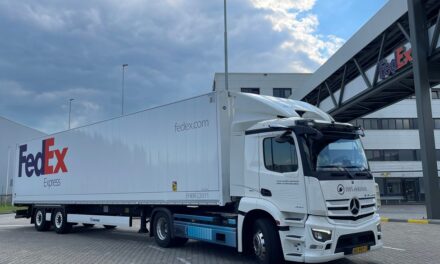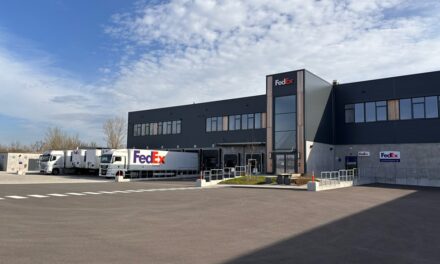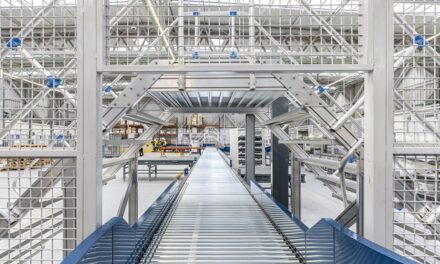
Promoting gender balance in industry

This article is an extract from the Summer Edition of MER Magazine published in May 2020. You can read the full article as well as other articles from MER for free by becoming a member of Post & Parcel today.
MER speaks to Louise Whitehouse, Managing Director, Fleet Maintenance Europe, FedEx Express, on becoming the first female Managing Director at FedEx two years ago, founding the company’s Women’s Inclusion Network, and her work to push the boundaries and expectations for women in logistics.
What drew you to the logistics sector?
When I was younger, I spent many sleepless nights imagining myself in a multitude of different jobs and even as I neared the end of my education, I still didn’t know what sector I wanted to specialise in. But by 1988, I’d made my decision.
I began working in Customer Service for TNT Express, before moving to operations six months later. Having made the move, I knew straight away I had made the right decision and still to this day, I’ve never looked back.
There were many initial influences that attracted me to the logistics sector, but the hugely varied selection of job roles was the main draw. The opportunity to work alongside incredible people in a fast-paced industry also appealed, as did the challenge of working in a male dominated environment. Perhaps most importantly though it was the fact that I would be able to work with vehicles, which I still love doing today.
Can you give me an overview of your role?
In my current role I am responsible for fleet maintenance across Europe, which includes pickup and delivery vehicles and ground service equipment which in total is more than 11,000 individual assets.
It is my responsibility to ensure that the integrity of our Health and Safety processes and legal compliance has at no point been compromised, and is therefore aligned with company and government policy. Whilst this may not sound especially exciting, it is business critical for FedEx. The safety of our people is always the priority, and this is something both myself and the team take great pride in.
I also work on more strategic projects, which include looking at future technologies, alternative fuels, the electrification of vehicles, GPS tracking and re-brand programmes. My role is incredibly diverse and fast-paced, more so than people would assume. It truly goes beyond the traditional understanding of fleet maintenance.
Why do you think the sector has primarily attracted men in the past?
The logistics sector has a history of attracting more men, than women.
The core of this issue is a combination of education and visibility. For the most part, the public-facing aspect of our work is undertaken by our drivers, in turn creating the perception that career opportunities in logistics are limited to being for the ‘man in the van’.
In fact, there are a vast array of roles available for people looking to build careers in logistics. Whilst historically these have been heavy duty roles with big parcels in big trucks, in today’s world of e-commerce and same-day delivery, the scope of career opportunities is much broader. This is helping to draw more women to the sector.
What specific challenges have you faced as a woman in the sector?
Initially convincing my colleagues, typically men, that I could do the same job as them, even when I was fully confident in my ability to perform the role. As one of only a few women in senior management positions it was intimidating at first, but that lit the fire in my belly that’s enabled me to go on and become the first female Managing Director for FedEx Express Operations in the UK
The most important thing I’ve learnt is that, regardless of whether you work in a male or female dominated environment, never lose sight of who you are and how and why you got there.
There are reasons why you succeeded, so back your ability and focus on changing perceptions and empowering a generation.
Tell me about the Women’s Inclusion Network at FedEx – why did you set it up?
I founded and launched the Women’s Inclusion Network (WIN) at FedEx to increase, advance and retain the number of females at all levels of the organisation.
We have so many great women in the business across all functions and levels, but we need to give them more self confidence in their own abilities to progress. By creating a support, development and mentoring network we are going to be able to champion, increase, advance and retain the number of females at all levels.
How has its purpose changed?
The purpose of the Women’s Inclusive Network is to help our female team members harness their power by learning from each other.
We help and support each other by sharing stories and advice, to build confidence and create purpose.
What do you hope the network will achieve in the future?
That it will continue to grow! I want to see new talent achieve their goals and progress within FedEx and that we can increase the number of female Director’s in the UK and continue well after I have retired!
What in your opinion can women bring to the industry?
The crux of a well-performing workforce is job satisfaction. If we can assure this for all our team members, then there is no reason why more women wouldn’t be tempted by a career in logistics.
We need to perpetuate the understanding that logistics is not a career better suited to men. This is a tired conversation with little conviction. On the contrary, a balanced and equal workforce is one that aims for success as a team and not as an individual. This ethos is carried through everything we do at FedEx and is ingrained into all of our 490,000 team members worldwide.
Why is international women’s day still important in today’s society where on the surface women now have the same opportunities as men?
It is important to ensure that everyone is aware that while many women appear to have the same rights and opportunities as men, some women cannot access those opportunities for broader socio-economic reasons beyond their control. We need to support those women.
What projects are you working on which you are particularly excited about?
I’m currently working on projects to do with alternative fuels, which will reduce the company’s impact on the environment, something I am very passionate about. Success in this project could deliver positive global changes and to be a part of that is a feeling I struggle to put into words sometimes. One thing that is for sure though – I absolutely love it!
I am also a member of the European Diversity and Inclusion Committee and this year will be leading on the topic of gender. Given the hard work that has gone in to WIN since last year, I am glad we have an opportunity to expand it across Europe, and open doors for the millions of women across the continent.
What would surprise people about your role?
I am not a qualified engineer and I am the first female to hold this role at FedEx!
What are your ambitions for your career/role?
Looking ahead, I will be integrating the individual European market teams into one collaborative unit Once this is completed, I will begin developing a successor as I work toward a potential VP position and continue pushing the boundaries and expectations for women both in logistics, and beyond.
About Louise Whitehouse
As Managing Director, Fleet Maintenance Europe, Louise is responsible for fleet maintenance across Europe, including managing more than 11,000 individual assets and being responsible for embedding the corporate vision. Louise has also taken on the additional task of founding and leading the Women’s Inclusion Network (WIN) at FedEx, established to increase, advance and retain the number of females at all levels of the organisation.
Louise believes in developing in-house talent and cultivating skills from inside the business and is passionate about encouraging the growth of young people in FedEx through apprenticeships and graduate placements.










